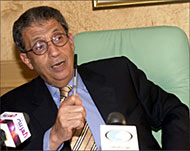Arab League to ‘avoid’ Palestine issue
Despite the assassination of Shaikh Ahmad Yasin by Israel on Monday, the issue of the Palestinian conflict is unlikely to dominate the agenda of the Arab League Summit next week, analysts say.

According to Middle Eastern pundits, Arab countries remain frightened of the US and helpless when it comes to the issue of the Palestinian-Israeli conflict.
“Talking about Palestine means confronting the US, and the Arab regimes can not afford to do that,” Abd Al-Bari Atwan, editor of London-based al-Quds al-Arabi, told Aljazeera.net.
“I believe they will avoid the issue completely. Arabs forget easily, so in a week from now the images of the funeral will not be remembered.”
The league, which celebrated its 59th birthday on Monday, has come under heavy criticism for failing to solve major issues facing the Arab world, primarily the Arab-Israeli conflict.
The 16th ordinary session of the league, to be held in Tunisia next Monday, will bring the majority of Arab heads of state together. A representative from the US-appointed Iraqi Interim Governing Council will also attend.
Tough agenda
Other pressing matters for the leaders include an Arab counter-proposal to the US Greater Middle East Initiative, a democracy plan for the region, and Iraq.
Professor of political sciences at Cairo University Hasan Nafaa remains pessimistic. “Issues such as Iraq and Palestine will be discussed, but Arabs know they can do nothing about them,” he said.
 |
|
Amr Musa says it is ‘absurd’ not |
“Any real movement on Palestine and Iraq can only come from the international community and resistance movements. Arabs know that.”
But the Arab League’s secretary-general thinks otherwise.
“This assassination has cast a shadow over the summit and the consequences of the elimination of Shaikh Yasin will be at the heart of discussions of the participating heads of state,” Amr Musa claimed in a statement on Monday.
Whether this will have impact on the ground remains questionable.
“The Arab leaders will come up with a vague resolution at the end of the summit but it will never be implemented as it is the case with the history of the Arab League,” said the Daily Star’s executive editor Rami Khuri.
Under criticism
Nafaa has also accused the summit of a lack of power.
|
“Any real movement Hasan Nafaa, |
He expects it to produce a well-presented document on political reform, but one which lacks substance. “Their recommendations will not be implemented,” he said.
Salah Issa, editor in chief of The Cairo newspaper, added. “I expect them to postpone major issues until the next summit in Algeria.”
Arab reform
In an attempt to counter the US democracy plan, Arab foreign ministers meeting in early March drafted a joint document on reforming politics in the region. The document, whose contents remain undisclosed, is expected to be presented at the Tunis summit.
According to its charter, the bloc of 22 member states aims at “strengthening the relations between the member-states, the coordination of their policies in order to achieve cooperation between them and to safeguard their independence and sovereignty; and a general concern with the affairs and interests of the Arab countries.”
 |
|
Established in 1945, the Arab |
Asked by Egyptian daily al-Ahram whether leaders would have time to study political reform, Musa said: “I hope so, because if the process of Arab (League) reform is not launched, it would be an absurd thing.”
Atwan remains unconvinced.
“This is a summit of terrified leaders who want to protect their regimes from internal and external calls for reform,” he said.
“A terrified person can not come up with a strong result. This summit is to protect the Arab regimes from the internal threats that call for reform and the international pressure that ask for democracy. It is not for Iraq nor Palestine.
“Lately we have been seeing more moves towards a normalisation of ties between the Arab countries and Israel.”